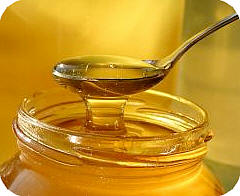What is honey?
According to Oxford Dictionary
/ˈhʌni /
1 [NOUN] A sweet, sticky yellowish-brown fluid made by bees and other insects from nectar collected from flowers.

But actually so much more
Although the Oxford dictionary provides a short and rather simple definition of what honey is, it seems clear that this description has quite a few shortcomings.
Honey is a naturally sweet substance that is prepared by honey bees (and only honey bees) from the nectar collected from flowers and other plants. Honey can also be prepared from honeydew, a secretion left by aphids living in and on certain deciduous trees, pines and firs.
The collected nectar is stored temporarily in the bee's stomach. Here the nectar partially digests: several different enzymes are added to it, changing the chemical composition. After this, the bee regurgitates the honey, and it is left in the honeycomb to ripen.
During the ripening process the excess water evaporates, making it a nice thick, syrup-like consistency. To speed up this process, the bees use their wings as fans.
Honey is more than sugar
Honey is a natural product with a high nutritional value.
An average polyfloral (mixed) honey contains per 100g:
| Energy |
1209 kJ 308 kcal |
| Proteins | 0,4g |
|
Carbohydrates sugars |
75,5g 75,1g |
| Fat | 0g |
Honey provides rapid energy
Honey has a complex composition of around 120 known, important biological substances for nutrition and maintenance.
The specific composition of each honey depends on the source of nectar.
Honey is a:
-
Supplier of rapid energy. Honey is 75% carbohydrates, namely glucose and fructose. Honey shouldn't contain added sugar. Because the honey has gone through a certain digestion process, it is easily digestible for humans. The natural sugars are absorbed into the body without any required breakdown processes.
- Supplier of vital substances like vitamins (B and C), enzymes, minerals (fosfor, calcium, magnesium, selenium, iron, zinc, and potassium). Amino acids, antibacterial substances, etc.



